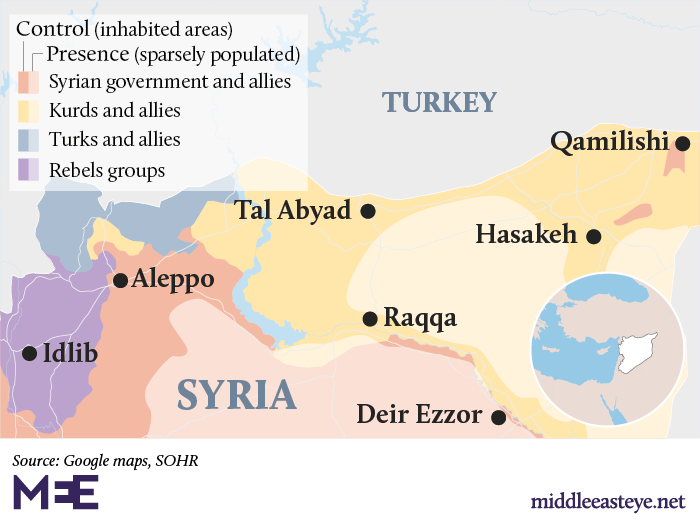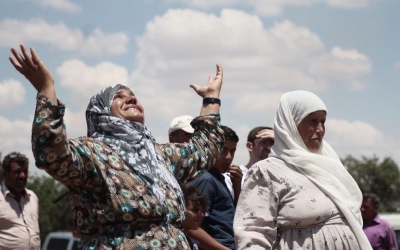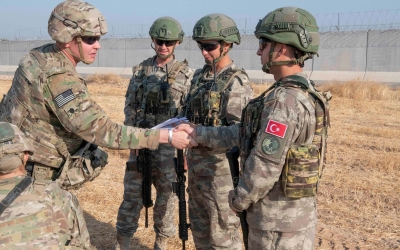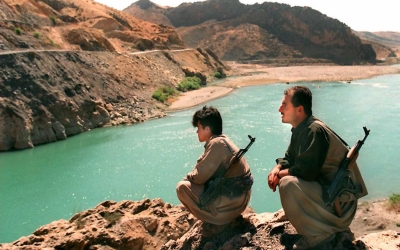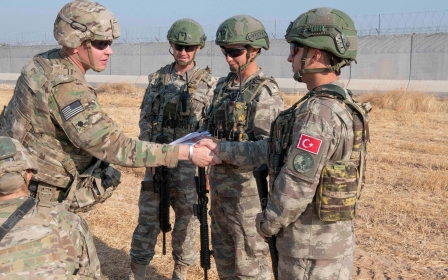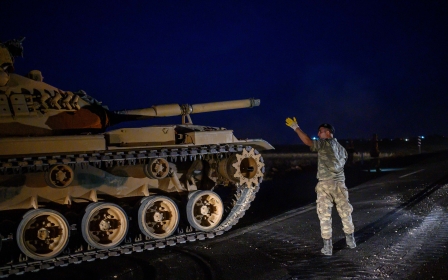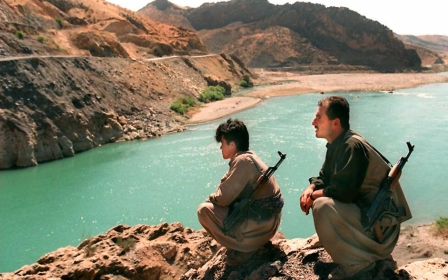Turkey begins offensive on Kurdish-held Syrian territory
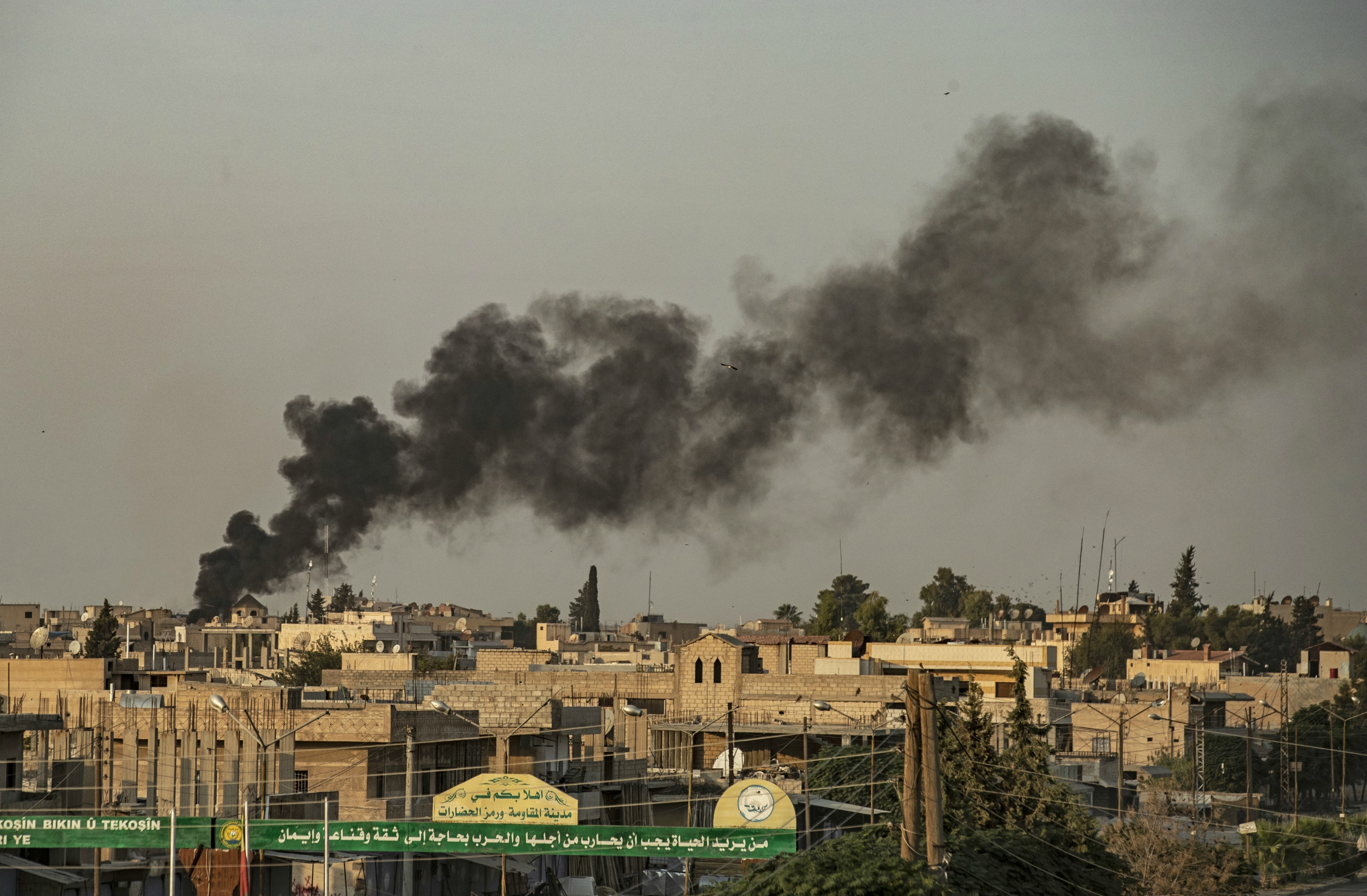
Turkey's assault on Kurdish-held northeastern Syria began on Wednesday, as air strikes and artillery pounded areas along the Syrian-Turkish border.
Ankara's defence ministry also announced the start of a ground offensive east of the Euphrates later on Wednesday.
The bombardment left two people dead and wounded two others in Mishrafa, local journalist Roj Mussa told Middle East Eye, a death toll later confirmed by the Kurdish-led Syrian Democratic Forces (SDF).
Mussa also said that Ras al-Ain, a border town, and Tal Abyad were hit by artillery shells.
"We can hear Turkish warplanes over both areas. People are scared and are trying to get out because they are afraid of getting killed," Mussa told MEE.
SDF spokesman Mustafa Bali echoed Mussa's reporting, tweeting: "Turkish warplanes have started to carry out air strikes on civilian areas. There is a huge panic among people of the region."
Why is Turkey invading northeast Syria?
+ Show - HideWho is fighting who?
Democratic Union Party (PYD)/Peoples Protection Units (YPG)
Founded in 2003, the PYD and its military wing the YPG are the ideological sister group of the Kurdistan Workers Party (PKK), which has fought a decades-long conflict with Turkey.
Following the beginning of the Syrian civil war in 2011, the PYD managed to take control of much of the Syria's north in the security vacuum that followed.
The group claims to espouse an ideology called "democratic confederalism", based on the ideology of PKK founder and leader Abdullah Ocalan, who has been in prison in Turkey since 1999.
Turkey
Turkey has long viewed the growth of the PYD with deep concern, and a peace process between Turkey and the PKK collapsed in 2015 in part over the spread of the Syrian Kurds' influence.
Since then, Erdogan has repeated his determination that he would "never allow the establishment of a Kurdish state in northern Syria".
What does Turkey want in northern Syria?
Turkey fears that a pro-PKK entity on its southern border would inevitably become a launchpad for attacks on Turkey.
In addition, Turkey wants to expell Syrian refugees from Turkey and resettle them in a "safe zone" it plans to create in northern Syria.
Turkey has the largest refugee population in the world, and the presence of Syrians in the country has increasingly led to animosity from Turks who blame them for crime, unemployment and the dilution of Turkish culture.
What does the PYD want in northern Syria?
The PYD's long-stated aim has been the creation of a statelet on the basis of Ocalan's ideology, as well as protecting Kurdish rights.
The area controlled by the PYD, known as Rojava, has established autonomy with networks of local councils and forums that aim to promote decentralised democracy - though the group has been accused of enforcing a one-party rule in the region.
What does the US-led coalition want?
Donald Trump was elected on a platform of isolationism and has touted the defeat of IS as the sole reason for US involvement in Syria - now that has largely taken place, Trump has argued the United States has no need to remain.
The biggest fear for the US and its allies is that Turkey's takeover of PYD-controlled areas could see the release of some of the 15,000 IS fighters previously captured by the Kurds and their allies.
What does the Syrian government (and its allies) want?
The Syrian government, as well as its close allies Iran and Russia, are happy about the US' decision to withdraw from the north, but have expressed concern about the violation of Syria's sovereignty by Turkey.
Syrian President Bashar al-Assad hopes that, when faced with the threat from Turkey, the PYD will throw their lot in with him in order to avoid total defeat.
Assad has repeatedly said he aims to regain control of all of Syria, and if the PYD was to ally with him formally, it would bring the largest area hitherto out of his control back under Damascus' influence.
The bombing was not restricted to border towns, however, as air strikes and shelling also hit the town of Ain Issa, located north of Raqqa, 35 kilometres from the border.
Since Turkish President Recep Tayyip Erdogan announced the beginning of the offensive on Wednesday afternoon, clouds of smoke have been rising over Ras al-Ain, Tal Abyad and other locations, including the city of Qamishli.
Hundreds of civilians have fled the bombardment, as Britain, France and Germany condemned the offensive and called for an emergency meeting of the United Nations Security Council.
'Safe zone'
The Turkish offensive has been anticipated ever since the United States announced on Sunday that it was withdrawing its forces from northeastern Syria, in a move widely condemned by Washington's allies.
US troops had been deployed to support the SDF in its fight against the Islamic State (IS) group, and domestic and international critics have accused President Donald Trump of abandoning his Kurdish allies - a charge he denies.
A Turkish military source told Reuters news agency that the offensive - dubbed "Operation Peace Spring" by Ankara - began with air strikes, targeting bases and ammunition depots belonging to the People's Protection Units (YPG). The YPG militia is a leading component of the SDF.
Earlier, AFP news agency said Turkey had sent armoured vehicles to the border with Syria, with a large convoy of dozens of vehicles seen in the Turkish town of Akcakale in Sanliurfa province.
The SDF said Turkish forces had already started shelling areas near the border on Tuesday.
"The Turkish military is shelling one of our points on #SereKaniye Border with Turkey," the SDF said in a tweet late on Tuesday, referring to Ras al-Ain.
"There were no injuries to our forces. We didn't respond to this unprovoked attack. We are prepared to defend the people and the people of NE #Syria," the SDF said.
The town was one of the places from which US troops withdrew on Monday, according to the Syrian Observatory for Human Rights, a UK-based activist group.
Writing in the Washington Post on Tuesday, Fahrettin Altun, Erdogan's communications director, said: "Turkey has no ambition in northeastern Syria except to neutralise a long-standing threat against Turkish citizens and to liberate the local population from the yoke of armed thugs."
Kurdish forces can either "defect" or Turkey will "have no choice but to stop them from disrupting our counter-Islamic State efforts", he added.
Ankara says it wants to establish a "safe zone" on the Syrian side of the border where it could send back some of the 3.6 million refugees that fled to Turkey as the eight-year civil war wages on.
Hamza Brigade
Turkish-backed Syrian rebel fighters had travelled from northwest Syria to Turkey in preparation for the incursion in Syria's northeast, Demiroren news agency (DHA) reported.
They will be based in the Turkish border town of Ceylanpinar, it said, across the border from Ras al-Ain, with 14,000 of them gradually joining the offensive.
The Hamza Brigade rebels from the National Army, the main armed group that Turkey supports in northwest Syria, travelled in a convoy of buses accompanied by trucks loaded with ammunition, DHA said.
Multiple launch rocket systems were reportedly stationed at Suruc, some 60km to the west, opposite the Syrian border town of Kobane, known as Ain al-Arab in Arabic.
Long-planned attack
Trump has blown hot and cold since a surprise announcement on Sunday that Washington was pulling back 50 to 100 "special operators" from Syria's northern frontier.
The troops had served as a buffer, preventing a long-planned attack by Turkey against Kurdish forces, who were crucial in the campaign to defeat IS but are viewed as "terrorists" by Ankara.
After appearing to give a green light to the Turkish invasion on Sunday, Trump later threatened to "obliterate" Turkey's economy if it went too far.
But he also gave a warm account of Turkey in other tweets and announced that Erdogan would visit Washington on 13 November.
"So many people conveniently forget that Turkey is a big trading partner of the United States," he said.
Ankara had already brushed aside Trump's warnings, with Vice President Fuat Oktay saying: "Turkey is not a country that will act according to threats."
'Many people feel anxious'
Turkey has always pushed hard against US support for Kurdish YPG forces in Syria due to their links with the outlawed Kurdistan Workers' Party (PKK), which has fought an insurgency against the Turkish state since 1984.
An activist with the Rojava Information Centre (RIC), an international group supportive of the SDF, told Middle East Eye that anxiety was building in Kobane.
'[A grandmother] said that she could not bear more grief and wanted to just "be left in peace by Erdogan"'
- Chloe Troadec, Rojava Information Centre
"Most feel the departure of American troops is a betrayal, but trust in their own self-defence forces to protect them," said Chloe Troadec.
"Still, many people feel anxious, particularly those who were forcefully expelled from their homes in Afrin by the Turkish invasion last year."
Operation Olive Branch, launched in January 2018, saw the Turkish army and its allies driving the pro-Kurdish group from the region of Afrin in northwest Syria.
Many fled to other areas controlled by the SDF.
"We visited a family who had fled from Afrin and settled in Kobane some months ago, after a stay in the refugee camps of Shehba/Til Rifaat area," said Troadec.
"The grandmother of the family told us of her experiences of the war, describing how one of her daughters was killed by the Turkish army while defending Afrin with the YPG women's units, and how her son died in the war against IS.
"She said that she could not bear more grief and wanted to just 'be left in peace by Erdogan'."
Damascus says Kurds have been 'tossed aside'
Kurdish-led forces have denounced the US policy shift as a "stab in the back".
Signalling a further potential shift in the region's power balance, the Kurdish-led forces said they might start talks with the Syrian government and Russia to fill a security vacuum in the event of a full US withdrawal.
Erdogan and Russia's President Vladimir Putin discussed in a phone call Turkey's planned operation, the Turkish presidency said on Wednesday.
Erdogan told Putin that the Turkish incursion will contribute to peace and stability in the country and open the way for the political process to resolve the conflict, the presidency added in a statement.
Meanwhile, the Syrian government has welcomed the upheaval, seeing an opportunity to bring the country's Kurds back into its fold.
The Kurds have been "tossed aside" by Washington, Syrian Deputy Foreign Minister Faisal Mekdad told the pro-government Al-Watan newspaper.
On Wednesday, the Syrian Kurdish-led administration in northern Syria welcomed a Russian call for dialogue with Damascus on Wednesday and urged Moscow to play a role as a guarantor.
"We view positively Russian Foreign Minister Sergei Lavrov's statements about the matter of dialogue between the self-administration and the Syrian government and we look to Russia having a role... as a supporter and guarantor," the administration said in a statement.
The administration said its long-held position has been that the best way to resolve the Syrian conflict is through intra-Syrian dialogue.
Middle East Eye propose une couverture et une analyse indépendantes et incomparables du Moyen-Orient, de l’Afrique du Nord et d’autres régions du monde. Pour en savoir plus sur la reprise de ce contenu et les frais qui s’appliquent, veuillez remplir ce formulaire [en anglais]. Pour en savoir plus sur MEE, cliquez ici [en anglais].


